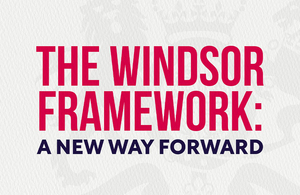The Windsor Framework, agreed by the Prime Minister and European Commission President, replaces the old Northern Ireland Protocol, providing a new legal and UK constitutional framework.
 A new way forward for a prosperous, stable future for Northern Ireland has been set out today (Monday 27 February), rewriting the Treaty to fix the practical problems for the people and businesses of Northern Ireland, protects Northern Ireland’s place within our Union, and restores the balance of the Belfast (Good Friday) Agreement in all its dimensions.
A new way forward for a prosperous, stable future for Northern Ireland has been set out today (Monday 27 February), rewriting the Treaty to fix the practical problems for the people and businesses of Northern Ireland, protects Northern Ireland’s place within our Union, and restores the balance of the Belfast (Good Friday) Agreement in all its dimensions.
The Windsor Framework, agreed by the Prime Minister and European Commission President today, replaces the old Northern Ireland Protocol, dealing with the issues it has created and providing a new legal and UK constitutional framework.
It delivers free-flowing trade in goods between Great Britain and Northern Ireland by removing any sense of the border in the Irish Sea for goods staying within the UK. These goods will travel as normal through a new green lane without red tape or unnecessary checks, with the only checks remaining designed to prevent smuggling or crime.
It protects Northern Ireland’s place in our Union, replacing swathes of EU laws with UK laws and ensuring the people of Northern Ireland can benefit from the same tax policies, food and drink, medicines, and parcels as the rest of the UK.
It puts the people of Northern Ireland in charge with active democratic consent. The Agreement rewrites the Treaty text with a new Stormont Brake that means the UK can veto new EU goods laws if they are not supported by both communities in Northern Ireland, which goes far beyond previous agreements or discussions on the old Protocol.
The Prime Minister will want to win the support of the DUP so it agrees to restore Stormont power-sharing, which the party has been blocking in protest against the protocol.
DUP leader Sir Jeffrey Donaldson said: “We’ll take our time to consider the detail and measure a deal against our seven tests.”
In what could be a challenging week of Mr Sunak’s premiership, he will also seek to avoid a backbench rebellion of Conservative Eurosceptics.
At today’s press conference, Prime Minister Rishi Sunak said:
“Today’s agreement is written in the language of laws and treaties. But really, it’s about much more than that.
“It’s about stability in Northern Ireland. It’s about real people and real businesses. It’s about showing that our Union, that has lasted for centuries, can and will endure.
“And it’s about breaking down the barriers between us. Setting aside the arguments that have for too long, divided us. And remembering the fellow feeling that defines us: This family of nations – this United Kingdom.”
The Windsor Framework delivers free-flowing movement of goods between Northern Ireland and Great Britain and removes any sense of a border in the Irish Sea within the UK:
- A new green lane (the UK internal market scheme) means traders moving goods destined for Northern Ireland will be freed of unnecessary paperwork, checks and duties, using only ordinary commercial information rather than burdensome customs bureaucracy or complex certification requirements for agrifood. The same type of standard commercial information used when moving goods from Birmingham to the Isle of Wight will be used Birmingham to Belfast. All goods destined for the EU will use the red lane.
- All requirements have been scrapped for trade from Northern Ireland to Great Britain on a permanent basis, including the requirement for export declarations.
- The green lane will be expanded to include food retailers such as supermarkets and hospitality businesses, significantly reducing SPS checks and costly paperwork, and ensuring choice for consumers on supermarket shelves. A single supermarket truck who previously had to provide 500 certificates can now instead make a straightforward commitment that goods will stay in Northern Ireland. Retailers will mark goods as “not for EU”, with a phased rollout of this requirement to give them time to adjust.
- Chilled meats like sausages, which were banned under the old Protocol, can move freely into Northern Ireland like other retail food products.
- Parcels from people or businesses in Great Britain can now be sent to friends, family, and consumers in Northern Ireland as they are today, without customs declarations, processes or extra costs under the old Protocol. Parcels sent business to business will travel via the green lane.
The agreement concludes months of intensive discussions between the UK and EU to address real world issues and needs of the people of Northern Ireland.
Providing reassurance for the future, the UK and EU have agreed to work together to anticipate and deal with any other issues that may emerge and have made a joint declaration to resolve issues through dialogue, rather than formal dispute proceedings.
Alongside ‘The Windsor Framework: a new way forward’, the Government has published the full range of legal texts that underpin the Windsor Framework. These solutions put arrangements in Northern Ireland on an entirely new footing, with far-reaching changes to the old Protocol to provide lasting certainty and stability for citizens and businesses in Northern Ireland.
To give businesses and individuals time to prepare, the implementation of the agreement will be phased in, with some of the new arrangements for goods, agrifood, pets and plant movements introduced later this year and the remainder in 2024. In the meantime, the current temporary standstill arrangements will continue to apply.
The UK Government will no longer proceed with the Northern Ireland Protocol Bill, as the UK and EU have come to a negotiated agreement. Similarly, the agreement will mean the EU withdrawing all of the legal actions it has launched against the UK.
Alison Horner, indirect tax partner at MHA, believes the devil will be in the details but that the issue of VAT divergence between GB and NI is likely to remain unresolved: “It may be trite to say the devil will be in the details but it is also true in this case. Since 1 January 2021 UK businesses trading with NI have found the new systems very challenging so we all hope Rishi Sunak’s new deal provides a solution: we just don’t know whether it will yet.
“There are big questions about the ‘green channel’ which is at the heart of the new deal’s solution to the trade issue. The reduction in checks for NI-destined goods will be a great coup for the UK government, but it will be the kind of compliance required to access these simplifications that will determine how much businesses actually benefit.
The green lane
“Authorisation for use of the green lane will be a major issue. The need for authorisation will mean that businesses will have to retain satisfactory records for both customs and probably VAT. The question here is whether the UK Trader Scheme (UKTS) will be used, or if a new, more intense, authorisation will be required by the EU to ensure that compliance is managed satisfactorily.
“There are other issues too. What happens if there is a load which includes goods which are ‘at risk’ as well as ‘not at risk’ of entering the EU? How will these be declared, and will the lorry still be required to enter the red lane even if there is one package which is ‘at risk’? If so this will negate a lot of the benefits of the new deal.
VAT
“The deal probably does not change the status quo on VAT. Recent changes to VAT on solar panels which was reduced to 0% for installation in GB could not be extended to NI. The deal is unlikely to see NI diverge from current EU VAT laws and so NI is still unlikely to benefit from GB’s ability to evolve and set its own VAT agenda. However, NI hugely benefits from being part of the EU due to VAT free trade within the EU and this benefit should not be underestimated.
“However, the deal could see a spotlight on VAT compliance. The XI VAT number can be seen as too easy to obtain and a loophole for moving goods which are green channel into the EU and vice versa. We have already seen increased scrutiny on the operation of the UKTS and expect this to become carefully managed by HMRC.”








